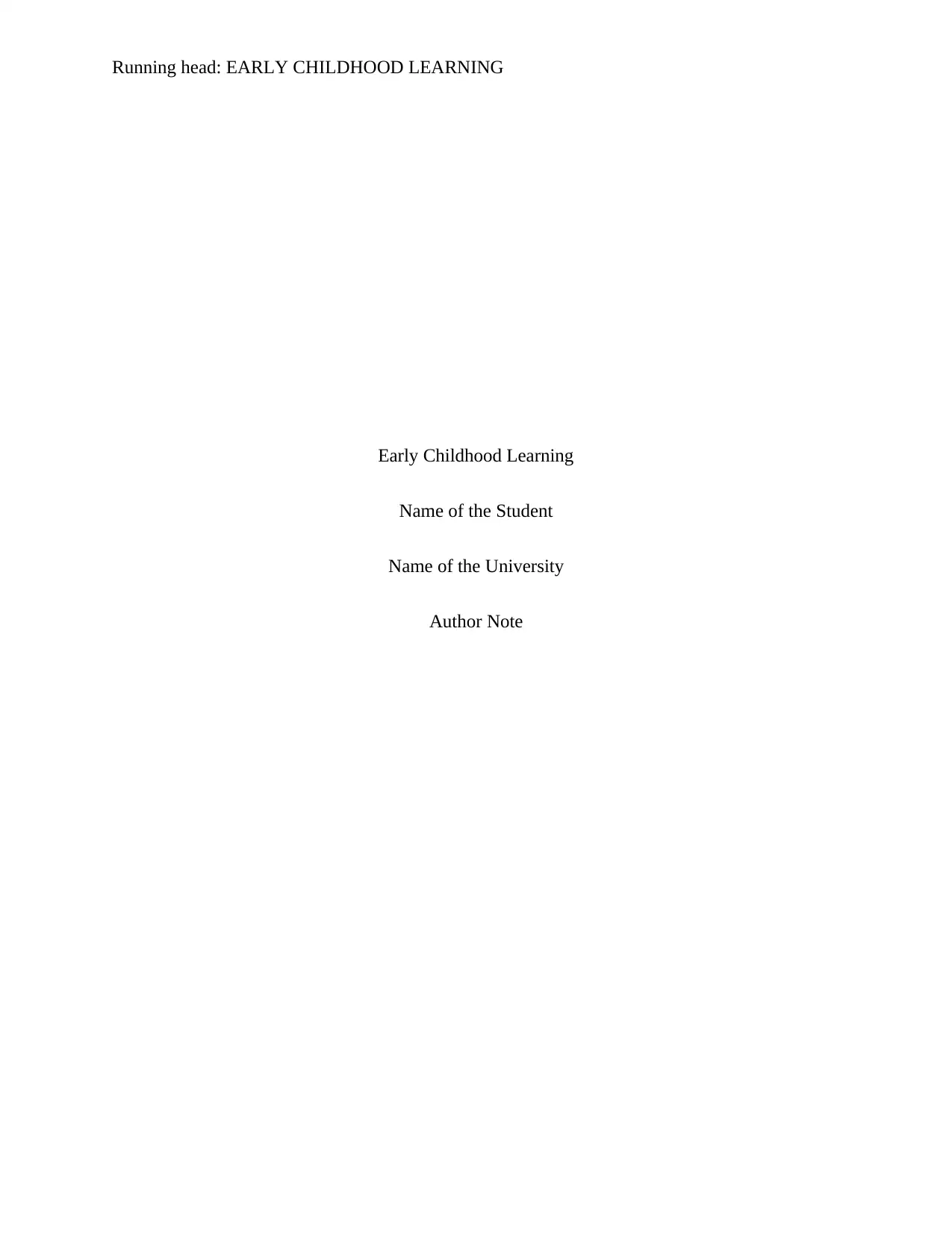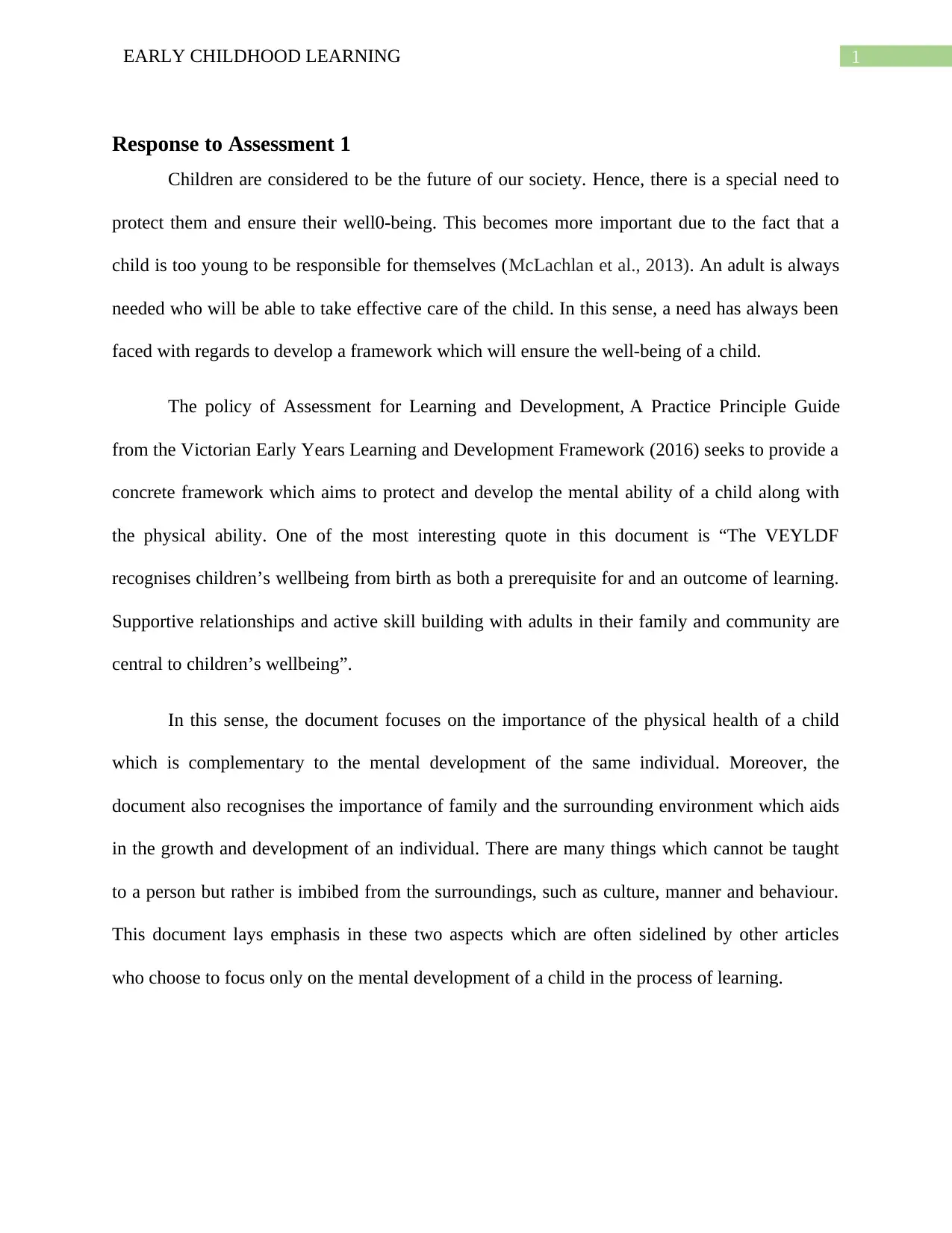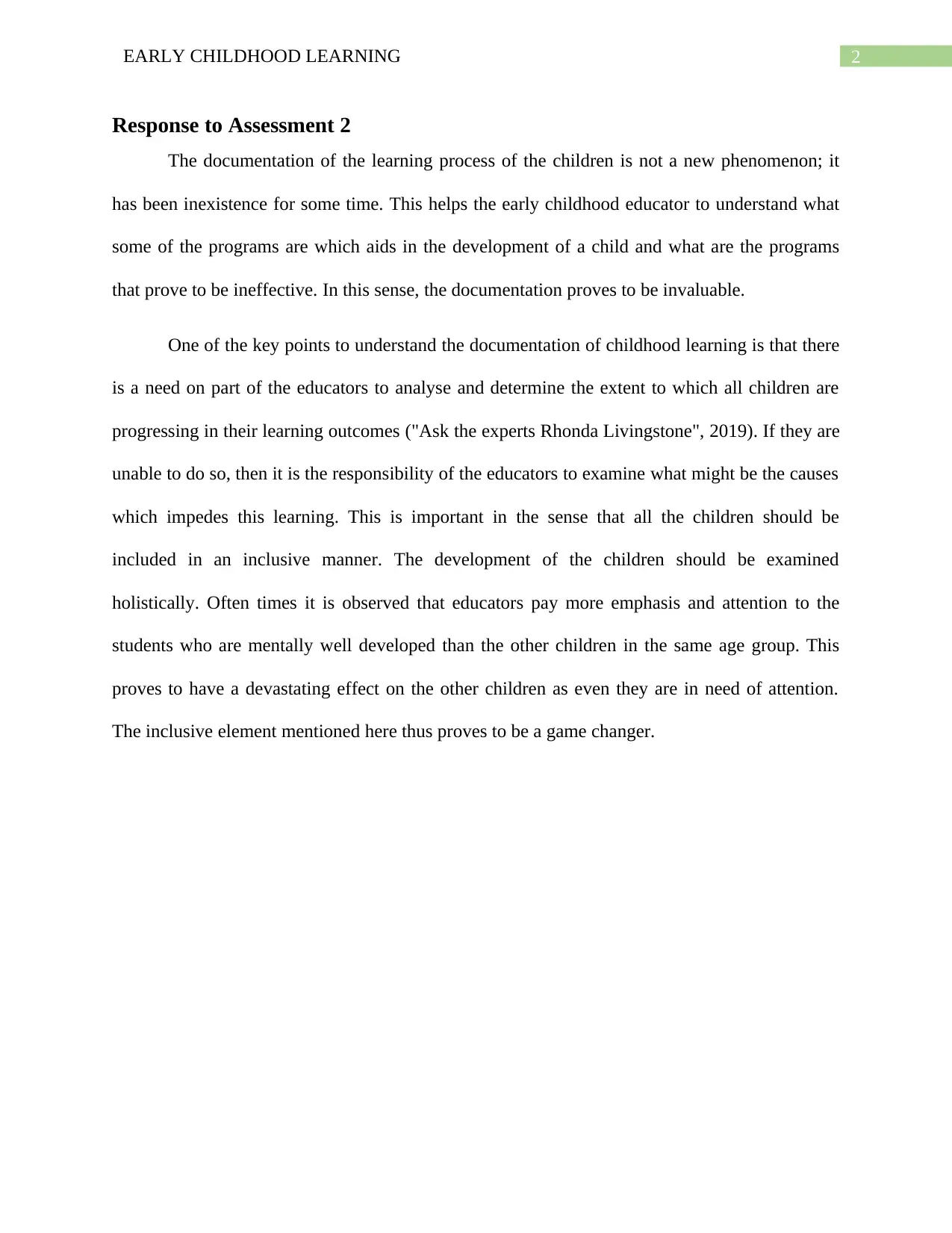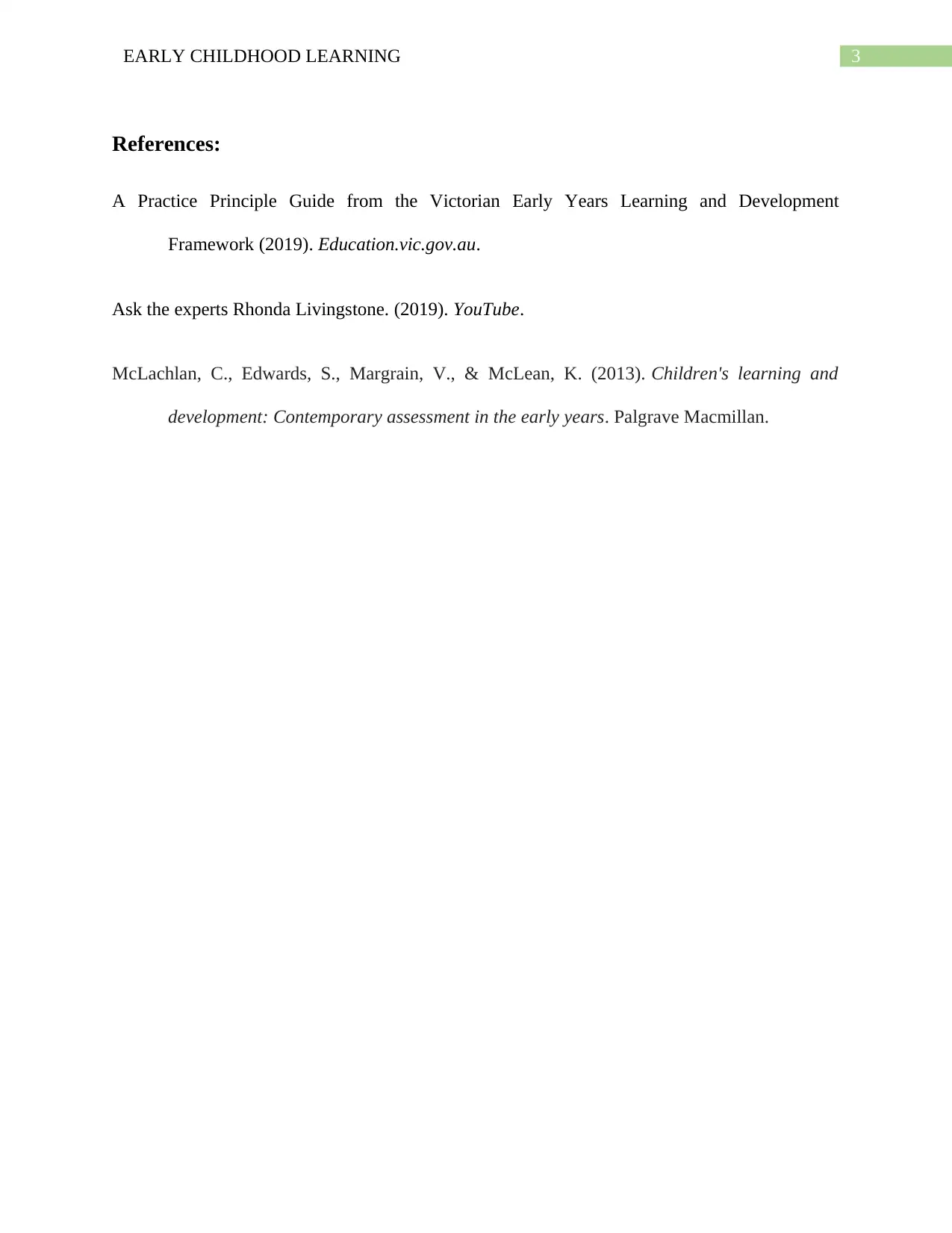Early Childhood Learning: Reflective Response to VEYLDF Assessment
VerifiedAdded on 2023/04/11
|4
|583
|102
Essay
AI Summary
This essay reflects on the Assessment for Learning and Development, A Practice Principle Guide from the Victorian Early Years Learning and Development Framework (VEYLDF). It highlights the importance of a child's well-being and the role of family and environment in their development. The essay also emphasizes the need for educators to inclusively assess and support all children's learning, considering both mental and physical development. It further discusses the significance of documenting the learning process to identify effective programs and address any impediments to a child's progress.

Running head: EARLY CHILDHOOD LEARNING
Early Childhood Learning
Name of the Student
Name of the University
Author Note
Early Childhood Learning
Name of the Student
Name of the University
Author Note
Paraphrase This Document
Need a fresh take? Get an instant paraphrase of this document with our AI Paraphraser

1EARLY CHILDHOOD LEARNING
Response to Assessment 1
Children are considered to be the future of our society. Hence, there is a special need to
protect them and ensure their well0-being. This becomes more important due to the fact that a
child is too young to be responsible for themselves (McLachlan et al., 2013). An adult is always
needed who will be able to take effective care of the child. In this sense, a need has always been
faced with regards to develop a framework which will ensure the well-being of a child.
The policy of Assessment for Learning and Development, A Practice Principle Guide
from the Victorian Early Years Learning and Development Framework (2016) seeks to provide a
concrete framework which aims to protect and develop the mental ability of a child along with
the physical ability. One of the most interesting quote in this document is “The VEYLDF
recognises children’s wellbeing from birth as both a prerequisite for and an outcome of learning.
Supportive relationships and active skill building with adults in their family and community are
central to children’s wellbeing”.
In this sense, the document focuses on the importance of the physical health of a child
which is complementary to the mental development of the same individual. Moreover, the
document also recognises the importance of family and the surrounding environment which aids
in the growth and development of an individual. There are many things which cannot be taught
to a person but rather is imbibed from the surroundings, such as culture, manner and behaviour.
This document lays emphasis in these two aspects which are often sidelined by other articles
who choose to focus only on the mental development of a child in the process of learning.
Response to Assessment 1
Children are considered to be the future of our society. Hence, there is a special need to
protect them and ensure their well0-being. This becomes more important due to the fact that a
child is too young to be responsible for themselves (McLachlan et al., 2013). An adult is always
needed who will be able to take effective care of the child. In this sense, a need has always been
faced with regards to develop a framework which will ensure the well-being of a child.
The policy of Assessment for Learning and Development, A Practice Principle Guide
from the Victorian Early Years Learning and Development Framework (2016) seeks to provide a
concrete framework which aims to protect and develop the mental ability of a child along with
the physical ability. One of the most interesting quote in this document is “The VEYLDF
recognises children’s wellbeing from birth as both a prerequisite for and an outcome of learning.
Supportive relationships and active skill building with adults in their family and community are
central to children’s wellbeing”.
In this sense, the document focuses on the importance of the physical health of a child
which is complementary to the mental development of the same individual. Moreover, the
document also recognises the importance of family and the surrounding environment which aids
in the growth and development of an individual. There are many things which cannot be taught
to a person but rather is imbibed from the surroundings, such as culture, manner and behaviour.
This document lays emphasis in these two aspects which are often sidelined by other articles
who choose to focus only on the mental development of a child in the process of learning.

2EARLY CHILDHOOD LEARNING
Response to Assessment 2
The documentation of the learning process of the children is not a new phenomenon; it
has been inexistence for some time. This helps the early childhood educator to understand what
some of the programs are which aids in the development of a child and what are the programs
that prove to be ineffective. In this sense, the documentation proves to be invaluable.
One of the key points to understand the documentation of childhood learning is that there
is a need on part of the educators to analyse and determine the extent to which all children are
progressing in their learning outcomes ("Ask the experts Rhonda Livingstone", 2019). If they are
unable to do so, then it is the responsibility of the educators to examine what might be the causes
which impedes this learning. This is important in the sense that all the children should be
included in an inclusive manner. The development of the children should be examined
holistically. Often times it is observed that educators pay more emphasis and attention to the
students who are mentally well developed than the other children in the same age group. This
proves to have a devastating effect on the other children as even they are in need of attention.
The inclusive element mentioned here thus proves to be a game changer.
Response to Assessment 2
The documentation of the learning process of the children is not a new phenomenon; it
has been inexistence for some time. This helps the early childhood educator to understand what
some of the programs are which aids in the development of a child and what are the programs
that prove to be ineffective. In this sense, the documentation proves to be invaluable.
One of the key points to understand the documentation of childhood learning is that there
is a need on part of the educators to analyse and determine the extent to which all children are
progressing in their learning outcomes ("Ask the experts Rhonda Livingstone", 2019). If they are
unable to do so, then it is the responsibility of the educators to examine what might be the causes
which impedes this learning. This is important in the sense that all the children should be
included in an inclusive manner. The development of the children should be examined
holistically. Often times it is observed that educators pay more emphasis and attention to the
students who are mentally well developed than the other children in the same age group. This
proves to have a devastating effect on the other children as even they are in need of attention.
The inclusive element mentioned here thus proves to be a game changer.
⊘ This is a preview!⊘
Do you want full access?
Subscribe today to unlock all pages.

Trusted by 1+ million students worldwide

3EARLY CHILDHOOD LEARNING
References:
A Practice Principle Guide from the Victorian Early Years Learning and Development
Framework (2019). Education.vic.gov.au.
Ask the experts Rhonda Livingstone. (2019). YouTube.
McLachlan, C., Edwards, S., Margrain, V., & McLean, K. (2013). Children's learning and
development: Contemporary assessment in the early years. Palgrave Macmillan.
References:
A Practice Principle Guide from the Victorian Early Years Learning and Development
Framework (2019). Education.vic.gov.au.
Ask the experts Rhonda Livingstone. (2019). YouTube.
McLachlan, C., Edwards, S., Margrain, V., & McLean, K. (2013). Children's learning and
development: Contemporary assessment in the early years. Palgrave Macmillan.
1 out of 4
Related Documents
Your All-in-One AI-Powered Toolkit for Academic Success.
+13062052269
info@desklib.com
Available 24*7 on WhatsApp / Email
![[object Object]](/_next/static/media/star-bottom.7253800d.svg)
Unlock your academic potential
Copyright © 2020–2026 A2Z Services. All Rights Reserved. Developed and managed by ZUCOL.





